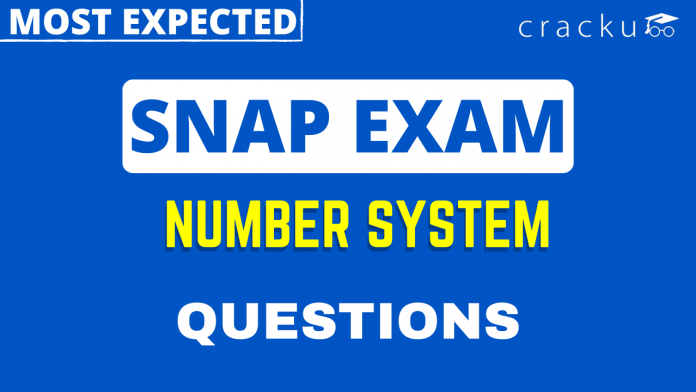Number System Questions for SNAP
Number System is an important topic in the Quant section of the SNAP Exam. You can also download this Free Number System Questions for SNAP PDF with detailed answers by Cracku. These questions will help you practice and solve the Number System questions in the SNAP exam. Utilize this PDF practice set, which is one of the best sources for practicing.
Download Number System Questions for SNAP
Enroll to SNAP 2022 Crash Course
Question 1: If $\frac{1}{x}$ is a positive fraction and $\frac{1}{y}$ is a negative fraction then which of the following statements are true
(A) $\frac{1}{x} + \frac{1}{y}$ is positive
(B) $\frac{1}{x} – \frac{1}{y}$ is positive
(C) $\frac{x – y}{xy}$ is negative
(D) $\frac{1}{xy}$ is positive
(E) $\frac{1}{x^2} – \frac{1}{y^2}$ is positive
Choose the correct answer from the options given below:
a) Only (A) & (B) are true
b) Only (B) & (C) are true
c) Only (D) & (E) are true
d) Only (A) & (E) are true
1) Answer (B)
Solution:
It is given that $\frac{1}{x}$ is positive and $\frac{1}{y}$ is negative, this implies that x is positive and y is negative.
A) $\frac{1}{x}\ +\ \frac{1}{y}$ is positive, we know x is positive, and y is negative, but we cannot conclude which value is greater. Therefore, this may or may not be true.
B)$\frac{1}{x}-\frac{1}{y}$ is positive; we know that x is positive and y is negative. So this statement is definitely true.
C) $\ \frac{\ x-y}{xy}$= -($\frac{1}{x}-\frac{1}{y}$)
As $\frac{1}{x}-\frac{1}{y}$ is positive, $\ \frac{\ x-y}{xy}$ is negative and statement is true.
D) $\frac{1}{xy}$ is negative as x is positive and y is negative. Therefore, the statement is false.
E)$\frac{1}{x^2}-\frac{1}{y^2}$ is positive only when $y^2>x^2$, but we cannot conclude which value is greater. Therefore, this may or may not be true.
Only (B) and (C) are true.
Answer is option B
Question 2: Four different clocks beep after every 25 minutes, 50 minutes, 1 hour 40 minutes and 2 hour 5 minutes. If all clocks beep together at 5 a.m., then when will they next beep together?
a) 12:00 noon
b) 5:00 p.m.
c) 1:20 p.m.
d) 11.20 a.m
2) Answer (C)
Solution:
It is mentioned that four clocks beep for every 25 minutes, 50 minutes, 100 minutes and 125 minutes.
All four clocks beep together for every LCM(25,50,100,125) minutes, i.e. 500 minutes.
500 minutes = 8 hours 20 minutes
All clocks next beep together at 5 am + 8 hours 20 minutes, i.e. 1:20 pm.
Answer is option C.
Question 3: Determine the number of positive integer ‘n’ where 1 $\le\ $ n $\le\ $ 100 and ‘n’ is not divisible by 2, 3 or 5.
a) 23
b) 25
c) 26
d) 29
3) Answer (C)
Solution:
The number of numbers divisible by 2 = 50
The number of numbers divisible by 3 = 33
The number of numbers divisible by 5 = 20
The number of numbers divisible by 2 and 3 = 16
The number of numbers divisible by 2 and 5 = 10
The number of numbers divisible by 3 and 5 = 6
The number of numbers divisible by 2, 3 and 5 = 3
The number of numbers divisible by 2, 3 or 5 = 50 + 33 + 20 – 16 – 10 – 6 + 3 =74
The number of numbers not divisible by 2, 3 or 5 = 100 – 74 = 26
Answer is option C.
Question 4: “xyz” and “zyx” are three digit numbers where x, y, z are distinct digits from 0 to 9. Differenceof xyz and zyx has a factor of 7. What is the maximum possible value of the LCM of x, y and z?
a) 126
b) 72
c) 90
d) 56
4) Answer (A)
Solution:
The difference between the numbers xyz and zyx will be a multiple of 99.
therefore, 99(x-z)= 99*7
x-z =7
No to maximise the LCM of x,y,z we can take x=9, y=7 and z=2
Therefore LCM=126
Question 5: The last two digits of the expression $1(1!)^{1!} + 2(2!)^{2!} + 3(3!)^{3!} + …. + 121(121!)^{121!}$
a) 61
b) 71
c) 81
d) 91
5) Answer (C)
Solution:
From the 5th term onwards the last two of all the terms will 00.
The last two digits of 24 to the power of an even number will be 76 always.
So, last two digits of the above expression will be the last two digits of $1+2\left(2\right)^2+3\left(6\right)^6+4\left(76\right)$
=1+8+139968+304= 140281
So last two digits is 81
Take SNAP mock tests here
Enrol to 10 SNAP Latest Mocks For Just Rs. 499
Question 6: For a 4-digit number, the sum of its digits in the thousands, hundreds and tens places is 14, the sum of its digits in the hundreds, tens and units places is 15, and the tens place digit is 4 more than the units place digit. Then the highest possible 4-digit number satisfying the above conditions is
6) Answer: 4195
Solution:
Given the 4 digit number :
Considering the number in thousands digit is a number in the hundredth digit is b, number in tens digit is c, number in the units digit is d.
Let the number be abcd.
Given that a+b+c = 14. (1)
b+c+d = 15. (2)
c = d+4. (3).
In order to find the maximum number which satisfies the condition, we need to have abcd such that a is maximum which is the digit in thousands place in order to maximize the value of the number. b, c, and d are less than 9 each as they are single-digit numbers.
Substituting (3) in (2) we have b+d+4+d = 15, b+2*d = 11. (4)
Subtracting (2) and (1) : (2) – (1) = d = a+1. (5)
Since c cannot be greater than 9 considering c to be the maximum value 9 the value of d is 5.
If d = 5, using d = a+1, a = 4.
Hence the maximum value of a = 4 when c = 9, d = 5.
Substituting b+2*d = 11. b = 1.
The highest four-digit number satisfying the condition is 4195
Question 7: For all possible integers n satisfying $2.25\leq2+2^{n+2}\leq202$, then the number of integer values of $3+3^{n+1}$ is:
7) Answer: 7
Solution:
$2.25\leq2+2^{n+2}\leq202$
$2.25-2\le2+2^{n+2}-2\le202-2$
$0.25\le2^{n+2}\le200$
$\log_20.25\le n+2\le\log_2200$
$-2\le n+2\le7.xx$
$-4\le n\le7.xx-2$
$-4\le n\le5.xx$
Possible integers = -4, -3, -2, -1, 0, 1, 2, 3, 4, 5
If we see the second expression that is provided, i.e
$3+3^{n+1}$, it can be implied that n should be at least -1 for this expression to be an integer.
So, n = -1, 0, 1, 2, 3, 4, 5.
Hence, there are a total of 7 values.
Question 8: Which of the given statements is an INCORRECT representation of the expression $1\frac{3}{4} \div \frac{1}{2}$ is ________.
a) Number of halves in $1\frac{3}{4}$
b) $1\frac{3}{4}$ times reciprocal of $\frac{1}{2}$
c) Half of $1\frac{3}{4}$
d) The expression is about finding the number whose half is $1\frac{3}{4}$
8) Answer (C)
Solution:
$1\frac{3}{4} \div \frac{1}{2}$ can be written as $\ \frac{\ 1\frac{3}{4}}{\frac{1}{2}}$
option C – Half of $1\frac{3}{4}$ will be written as $\ \frac{\ 1\frac{3}{4}}{2}$
Therefore, answer is option C.
Question 9: A positive integer when divided by q leaves remainder 21. When double that number isdivided by q, the remainder is 13. Then, q is _________.
a) 21
b) 29
c) 39
d) 37
9) Answer (B)
Solution:
Let the positive no. be N
N = kq + 21
N’ = 2N = 2kq + 42
Now N’ leaves a remainder of 13 when divided by q
So, N’ = pq + 13
Therefore Remainder when 42 is divided by q should be 13 which is only possible when q=29.
Question 10: Arrange the following rational numbers in ascendingorder:
(A) $\frac{-4}{5}$
(B) $\frac{-5}{12}$
(C) $ \frac{-7}{18}$
(D) $\frac{-2}{3}$
a) (A), (B), (D), (C)
b) (C), (D), (B), (A)
c) (A), (D), (B), (C)
d) (D), (C), (B), (A)
10) Answer (C)
Solution:
We have :
$-\frac{4}{5}\ ,\ -\frac{5}{12}\ ,\ -\frac{7}{18}\ ,\ -\frac{2}{3}$
Now LCM is 180
so we get :
$-\frac{144}{180}\ ,\ -\frac{75}{180}\ ,\ -\frac{70}{180}\ ,\ -\frac{120}{180}$
Now arranging in ascending order
we get :
$-\frac{144}{180}\ <\ -\frac{120}{180}<-\frac{75}{180}<-\frac{70}{180}$
so order is A<D<B<C





